Fleurs du Mal Magazine


Or see the index
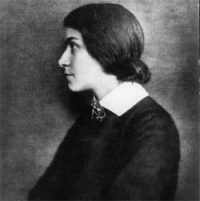
Mein blaues Klavier
Ich habe zu Hause ein blaues Klavier
Und kenne doch keine Note.
Es steht im Dunkel der Kellertür,
Seitdem die Welt verrohte.
Es spielten Sternenhände vier
-Die Mondfrau sang im Boote-
Nun tanzen die Ratten im Geklirr.
Zerbrochen ist die Klaviatür…..
Ich beweine die blaue Tote.
Ach liebe Engel öffnet mir
-Ich aß vom bitteren Brote-
Mir lebend schon die Himmelstür-
Auch wider dem Verbote.
Else Lasker-Schüler
(1869 – 1945)
Mein blaues Klavier
• fleursdumal.nl magazine
More in: Archive K-L, Archive K-L, Lasker-Schüler, Else
From the Number One Sunday Times bestselling author of milk and honey and the sun and her flowers comes her greatly anticipated third collection of poetry.
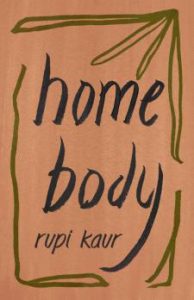
Rupi Kaur constantly embraces growth, and in home body, she walks readers through a reflective and intimate journey visiting the past, the present and the potential of the self. home body is a collection of raw, honest conversations with oneself – reminding readers to fill up on love, acceptance, community, family, and embrace change. illustrated by the author, themes of nature and nurture, light and dark, rest here.
i dive into the well of my body
and end up in another world
everything i need
already exists in me
there’s no need
to look anywhere else
– home
rupi kaur is a poet. artist. and performer. as a 21-year-old university student rupi wrote. illustrated. and self-published her first poetry collection milk and honey. next came its artistic sibling the sun and her flowers. these collections have sold over 8 million copies and have been translated into over 40 languages. home body is her third collection of poetry. rupi’s work touches on love. loss. trauma. healing. femininity. and migration. she feels most at home when creating art or performing her poetry onstage.
Rupi Kaur
Home Body
Paperback
ISBN : 9781471196720
Publisher: Simon & Schuster UK
November 17, 2020
English Poetry
$13.59
# new poetry
Rupi Kaur
Home Body
• fleursdumal.nl magazine
More in: - Book News, Archive K-L, Archive K-L, Art & Literature News, Kaur, Rupi
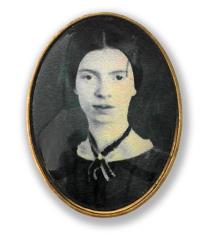
A Portrait
A face devoid of love or grace,
A hateful, hard, successful face,
A face with which a stone
Would feel as thoroughly at ease
As were they old acquaintances, —
First time together thrown.
Emily Dickinson
(1830-1886)
A Portrait
• fleursdumal.nl magazine
More in: Archive C-D, Archive C-D, Dickinson, Emily
Gedichten zijn overal: op straat, op gebouwen, in liedjes en films. En ze raken ons en blijven ons soms een leven lang bij, als een troost tijdens duistere nachten of een woordgrapje dat een glimlach oproept.
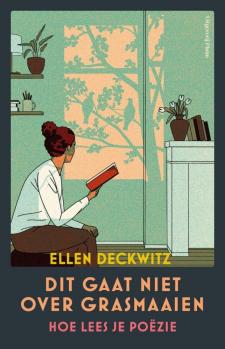 Toch deinzen mensen achteruit als ze het woord poëzie horen: te moeilijk, niks voor mij. Maar het is wél iets voor jou. Ellen Deckwitz legt uit waarom, biedt een helpende hand en neemt je mee langs de vele ontroerende, dramatische, ronduit hilarische en verbeeldingsrijke paden die de poëzie rijk is.
Toch deinzen mensen achteruit als ze het woord poëzie horen: te moeilijk, niks voor mij. Maar het is wél iets voor jou. Ellen Deckwitz legt uit waarom, biedt een helpende hand en neemt je mee langs de vele ontroerende, dramatische, ronduit hilarische en verbeeldingsrijke paden die de poëzie rijk is.
Poëzie voor dummy’s. Een heerlijk boek dat niet alleen over lezen, maar ook over het leven gaat.
Ellen Deckwitz (1982) is een van de belangrijkste hedendaagse jonge dichters. Ze was Nederlands Kampioen Poetry Slam in 2009 en won met De steen vreest mijde C. Buddingh’-prijs voor het beste poëziedebuut. Ze is een geziene gast op festivals als Lowlands, de Nacht van de Poëzie en Saint Amour, ze draagt haar werk regelmatig voor op televisie en schrijft gedichten over het nieuws voor de NRC.
Ellen Deckwitz
Dit gaat niet over grasmaaien
24-09-2020
Nederlands
Paperback
Druk 1
oktober 2020
140 pagina’s
Uitgeverij Pluim
EA 9789083095318
EUR 19,99
# more poetry
Ellen Deckwitz
• fleursdumal.nl magazine
More in: #Editors Choice Archiv, - Book News, - Bookstores, Archive C-D, Archive C-D, Marsman, Lieke
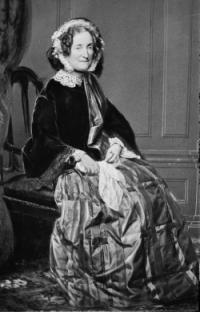
“Laborare est Orare”
To labor is to pray,
As some dear saint has said,
And with this truth for many a day
Have I been comforted.
The Lord has made me bold
When I have labored most,
And with his gifts so manifold,
Has given the Holy Ghost
When I have idle been
Until the sun went down,
Mine eyes, so dim, have never seen
His bright, prophetic crown.
O, praise the Lord for work
Which maketh time so fleet,
In which accusers never lurk,
Whose end is very sweet.
Mrs. Sigourne
(Lydia Huntley Sigourney,
1791 – 1865)
“Laborare est Orare”
• fleursdumal.nl magazine
More in: Archive S-T, Archive S-T, CLASSIC POETRY
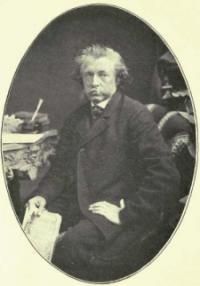
True Love
Her love is like the hardy flower
That blooms amid the Alpine snows;
Deep-rooted in an icy bower,
No blast can chill its sweet repose;
But fresh as is the tropic rose,
Drenched in mellowest sunny beams,
It has as sweet delicious dreams
As any flower that grows.
And though an avalanche came down
And robbed it of the light of day,
That which withstood the tempest’s frown
In grief would never pine away.
Hope might withhold her feeblest ray,
Within her bosom’s snowy tomb
Love still would wear its everbloom,
The gayest of the gay.
Charles Sangster
(1822 – 1893)
True Love
•fleursdumal.nl magazine
More in: Archive S-T, Archive S-T, CLASSIC POETRY
Na een aantal dichtbundels verscheen onlangs bij Uitgeverij IJzer (Utrecht) de debuutroman, van Nick J. Swarth: ‘1980 – De plasserparadox’.
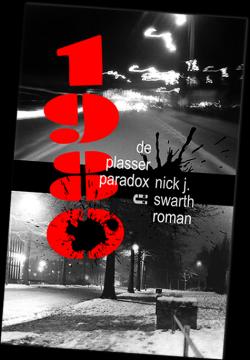
Het jaar is 1980, het decor een troosteloze provinciestad, waarin werkeloosheid, armoe en woningnood hoogtij vieren. Het failliet van de textielnijverheid komt met industriële ruïnes en kaalslag in het hart van de stad. Dit bleke toneel biedt in zijn grimmigheid een ideale voedingsbodem voor de jeugdige dadendrang van de no-future generatie.
In ‘1980 – De plasserparadox’ schetst de tijdgeest in verbeten, zelden geziene grauwtinten de staat van de stad X-Burg (Tilburg). Emiel de B. dook onder in de nacht. Dr. Pink bedrijft graffiti. Ratel valt op zijn beste vriend. Liefde en politieke daadkracht binden Chloë en Loumi. Yani is een kiene travestiet.
In caleidoscopische scenes toont de roman de strapatsen van een generatie die in het kielzog van de emancipatie pal staat voor haar geaardheid. Het is de tijd van activisme, kraken en nieuwe muziek, waarin het persoonlijke politiek is en de hoop op een betere wereld groot. Maar dat is gerekend buiten de stad.

Over de auteur: Nick J. Swarth is als maker actief in diverse disciplines, maar het uitgangspunt is altijd tekst. ‘Shabby Art That Falls Apart’ is de verzamelnaam voor het beeldend werk, dat bestaat uit tekeningen en assemblages.
Swarth is ook de stem van het noise rock trio Betonfraktion, dat drie platen uitbracht. In 2016 verscheen ‘I Changed My Sex’.
Van 2005-2007 was Swarth stadsdichter van Tilburg. Poëzie in het publieke domein krijgt vorm in het project ‘On-site poetry’ (i.s.m. Sander Neijnens).
Meest recente publicaties: ‘Mijn onsterfelijke lever’ (gedichten); ‘¡Mondo Manga!’ (gedichten); “Horror Vacui | een docudrama in 14 staties’, verslag van een schandaal verwekkend kunstproject (i.s.m. Jeroen de Leijer).
Uitgeverij IJzer Utrecht
Nick J. Swarth:
‘1980 – De plasserparadox’
Paperback
Formaat: 15 x 23 cm
Omvang: 432 pagina’s
ISBN: 978 90 8684 220 9
Prijs: € 25,-
Bestellen kan ook rechtstreeks bij de uitgeverij:
https://www.uitgeverij-ijzer.nl/boeken/288-1980-de-plasserparadox
Uitgeverij IJzer
Lessinglaan 97
3533 AV Utrecht
Telefoon: 030 – 2521798
e-mail: info@uitgeverij-ijzer.nl
• fleursdumal.nl magazine
More in: - Book News, - Bookstores, Archive S-T, Archive S-T, Art & Literature News, Betonfraction, Nick J. Swarth, Swarth, Nick J.

Brexit blues
Voor hetere vuren hadden ze gestaan, met
geloken blikken vol mist op verre zeevaart.
Ze dachten grage menners wel te herkennen,
en hun beduimelde beloften ras te doorzien.
Nu wachten de weglopers ginds achter breed
water bang af wat komt, in hun andere uren.
Bert Bevers
gedicht
Brexit blues
(ongepubliceerd)
• fleursdumal.nl magazine
More in: Archive A-B, Archive A-B, Bevers, Bert, MONTAIGNE
Three and One are One
In the year 1861 Barr Lassiter, a young man of twenty-two, lived with his parents and an elder sister near Carthage, Tennessee. The family were in somewhat humble circumstances, subsisting by cultivation of a small and not very fertile plantation. Owning no slaves, they were not rated among “the best people” of their neighborhood; but they were honest persons of good education, fairly well mannered and as respectable as any family could be if uncredentialed by personal dominion over the sons and daughters of Ham.
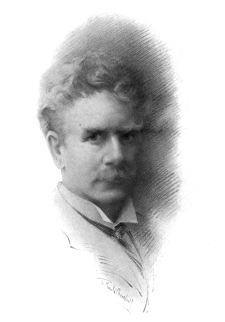 The elder Lassiter had that severity of manner that so frequently affirms an uncompromising devotion to duty, and conceals a warm and affectionate disposition. He was of the iron of which martyrs are made, but in the heart of the matrix had lurked a nobler metal, fusible at a milder heat, yet never coloring nor softening the hard exterior. By both heredity and environment something of the man’s inflexible character had touched the other members of the family; the Lassiter home, though not devoid of domestic affection, was a veritable citadel of duty, and duty—ah, duty is as cruel as death!
The elder Lassiter had that severity of manner that so frequently affirms an uncompromising devotion to duty, and conceals a warm and affectionate disposition. He was of the iron of which martyrs are made, but in the heart of the matrix had lurked a nobler metal, fusible at a milder heat, yet never coloring nor softening the hard exterior. By both heredity and environment something of the man’s inflexible character had touched the other members of the family; the Lassiter home, though not devoid of domestic affection, was a veritable citadel of duty, and duty—ah, duty is as cruel as death!
When the war came on it found in the family, as in so many others in that State, a divided sentiment; the young man was loyal to the Union, the others savagely hostile. This unhappy division begot an insupportable domestic bitterness, and when the offending son and brother left home with the avowed purpose of joining the Federal army not a hand was laid in his, not a word of farewell was spoken, not a good wish followed him out into the world whither he went to meet with such spirit as he might whatever fate awaited him.
Making his way to Nashville, already occupied by the Army of General Buell, he enlisted in the first organization that he found, a Kentucky regiment of cavalry, and in due time passed through all the stages of military evolution from raw recruit to experienced trooper. A right good trooper he was, too, although in his oral narrative from which this tale is made there was no mention of that; the fact was learned from his surviving comrades. For Barr Lassiter has answered “Here” to the sergeant whose name is Death.
Two years after he had joined it his regiment passed through the region whence he had come. The country thereabout had suffered severely from the ravages of war, having been occupied alternately (and simultaneously) by the belligerent forces, and a sanguinary struggle had occured in the immediate vicinity of the Lassiter homestead. But of this the young trooper was not aware.
Finding himself in camp near his home, he felt a natural longing to see his parents and sister, hoping that in them, as in him, the unnatural animosities of the period had been softened by time and separation. Obtaining a leave of absence, he set foot in the late summer afternoon, and soon after the rising of the full moon was walking up the gravel path leading to the dwelling in which he had been born.
Soldiers in war age rapidly, and in youth two years are a long time. Barr Lassiter felt himself an old man, and had almost expected to find the place a ruin and a desolation. Nothing, apparently, was changed. At the sight of each dear and familiar object he was profoundly affected. His heart beat audibly, his emotion nearly suffocated him; an ache was in his throat. Unconsciously he quickened his pace until he almost ran, his long shadow making grotesque efforts to keep its place beside him.
The house was unlighted, the door open. As he approached and paused to recover control of himself his father came out and stood bare-headed in the moonlight.
“Father!” cried the young man, springing forward with outstretched hand—“Father!”
The elder man looked him sternly in the face, stood a moment motionless and without a word withdrew into the house. Bitterly disappointed, humiliated, inexpressibly hurt and altogether unnerved, the soldier dropped upon a rustic seat in deep dejection, supporting his head upon his trembling hand. But he would not have it so: he was too good a soldier to accept repulse as defeat. He rose and entered the house, passing directly to the “sitting-room.”
It was dimly lighted by an uncurtained east window. On a low stool by the hearthside, the only article of furniture in the place, sat his mother, staring into a fireplace strewn with blackened embers and cold ashes. He spoke to her—tenderly, interrogatively, and with hesitation, but she neither answered, nor moved, nor seemed in any way surprised. True, there had been time for her husband to apprise her of their guilty son’s return. He moved nearer and was about to lay his hand upon her arm, when his sister entered from an adjoining room, looked him full in the face, passed him without a sign of recognition and left the room by a door that was partly behind him. He had turned his head to watch her, but when she was gone his eyes again sought his mother. She too had left the place.
Barr Lassiter strode to the door by which he had entered. The moonlight on the lawn was tremulous, as if the sward were a rippling sea. The trees and their black shadows shook as in a breeze. Blended with its borders, the gravel walk seemed unsteady and insecure to step on. This young soldier knew the optical illusions produced by tears. He felt them on his cheek, and saw them sparkle on the breast of his trooper’s jacket. He left the house and made his way back to camp.
The next day, with no very definite intention, with no dominant feeling that he could rightly have named, he again sought the spot. Within a half-mile of it he met Bushrod Albro, a former playfellow and schoolmate, who greeted him warmly.
“I am going to visit my home,” said the soldier.The other looked at him rather sharply, but said nothing.
“I know,” continued Lassister, “that my folks have not changed, but—”
There have been changes,” Albro interrupted—“everything changes. I’ll go with you if you don’t mind. We can talk as we go.”
But Albro did not talk.
Instead of a house they found only fire-blackened foundations of stone, enclosing an area of compact ashes pitted by rains.
Lassiter’s astonishment was extreme.
“I could not find the right way to tell you,” said Albro. “In the fight a year ago your house was burned by a Federal shell.”
“And my family—where are they?”
“In Heaven, I hope. All were killed by the shell.”
Ambrose Bierce
(1842 – 1913/1914 ?)
Three and One are One
• fleursdumal.nl magazine
More in: Archive A-B, Archive A-B, Bierce, Ambrose, Bierce, Ambrose
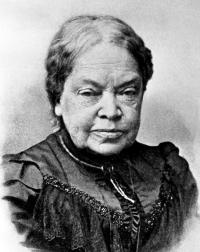
Sommermorgen
Auf Bergeshöhen schneebedeckt,
Auf grünen Hügeln weitgestreckt
Erglänzt die Morgensonne;
Die tauerfrischten Zweige hebt
Der junge Buchenwald und bebt
Und bebt in Daseinswonne.
Es stürzt in ungestümer Lust
Herab aus dunkler Felsenbrust
Der Gießbach mit Getose,
Und blühend Leben weckt sein Hauch
Im stolzen Baum, im niedren Strauch,
In jedem zarten Moose.
Und drüben wo die Wiese liegt,
Im Blütenschmuck, da schwirrt und fliegt
Der Mücken Schwarm und Immen.
Wie sich’s im hohen Grase regt
Und froh geschäftig sich bewegt,
Und summt mit feinen Stimmen.
Es steigt die junge Lerche frei
Empor gleich einem Jubelschrei
Im Wirbel ihrer Lieder.
Im nahen Holz der Kuckuck ruft,
Die Amsel segelt durch die Luft
Auf goldenem Gefieder.
O Welt voll Glanz und Sonnenschein,
O rastlos Werden, holdes Sein,
O höchsten Reichtums Fülle!
Und dennoch, ach – vergänglich nur
Und todgeweiht, und die Natur
Ist Schmerz in Schönheitshülle.
Marie Ebner-Eschenbach
(1830 – 1916)
Sommermorgen
• fleursdumal.nl magazine
More in: Archive E-F, Archive E-F, CLASSIC POETRY
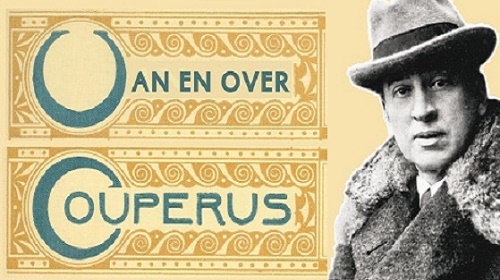
Het Feest der Poëzie brengt een afwisselende voorstelling met werk van en muziek uit het werk van de grootste Nederlandse romanschrijver.
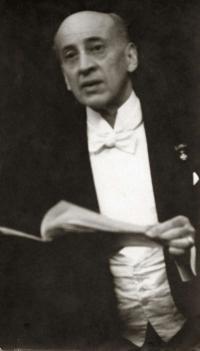 Voordrachtskunstenaar Simon Mulder brengt bekend en minder bekend werk van Louis Couperus, zoals fragmenten uit de schokkend decadente roman ´De berg van licht´, en de vertederende korte verhalen ‘Het spoorwegongeluk’ en ‘Het verbeelde leven’.
Voordrachtskunstenaar Simon Mulder brengt bekend en minder bekend werk van Louis Couperus, zoals fragmenten uit de schokkend decadente roman ´De berg van licht´, en de vertederende korte verhalen ‘Het spoorwegongeluk’ en ‘Het verbeelde leven’.
Daarnaast vertelt hij enkele anekdotes over de grote schrijver die koekjes kocht (maar hoe?), na een optreden niet aan het voor hem georganiseerde erediner kon beginnen, en hoe en waarom hij door een Amerikaanse toeriste aangetroffen werd in een parfumerie.
Pianist Daan van de Velde en Simon Mulder besluiten de voorstelling met iets unieks: een declamatorium (stuk voor piano en voordracht) op Couperus’ beroemde korte thriller ‘De binocle’.
Data en praktische informatie:
2 voorstellingen, aanvang 20 en 21.30 uur
Locatie: Theatercafé Mascini, Zeedijk 24, 1012 AZ Amsterdam
Datum: zaterdagavond 28 november 2020
Duur: ca. 60 minuten
Entree: 12.- euro
Kaartverkoop: https://cafemascini.nl
Meer informatie over het Feest der Poëzie: www.feestderpoezie.nl
fleursdumal.nl magazine
www.fleursdumal.nl
More in: Archive C-D, Archive C-D, Art & Literature News, Feest der Poëzie, Louis Couperus
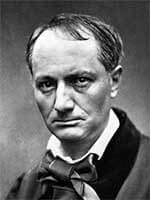
Sisina
Imaginez Diane en galant équipage,
Parcourant les forêts ou battant les halliers,
Cheveux et gorge au vent, s’enivrant de tapage,
Superbe et défiant les meilleurs cavaliers!
Avez-vous vu Théroigne, amante du carnage,
Excitant à l’assaut un peuple sans souliers,
La joue et l’oeil en feu, jouant son personnage,
Et montant, sabre au poing, les royaux escaliers?
Telle la Sisina! Mais la douce guerrière
À l’âme charitable autant que meurtrière;
Son courage, affolé de poudre et de tambours,
Devant les suppliants sait mettre bas les armes,
Et son coeur, ravagé par la flamme, a toujours,
Pour qui s’en montre digne, un réservoir de larmes.
Charles Baudelaire
(1821-1867)
Sisina
(poème)
• fleursdumal.nl magazine
More in: Archive A-B, Archive A-B, Baudelaire, Baudelaire, Charles
Thank you for reading Fleurs du Mal - magazine for art & literature